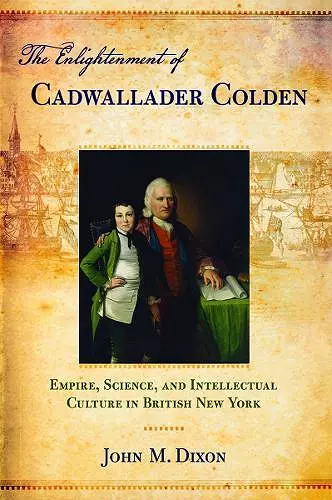The Enlightenment of Cadwallader Colden
Empire, Science, and Intellectual Culture in British New York
Format:Hardback
Publisher:Cornell University Press
Published:12th Apr '16
Currently unavailable, and unfortunately no date known when it will be back

Was there a conservative Enlightenment? Could a self-proclaimed man of learning and progressive science also have been an agent of monarchy and reaction? Cadwallader Colden (1688–1776), an educated Scottish emigrant and powerful colonial politician, was at the forefront of American intellectual culture in the mid-eighteenth century. While living in rural New York, he recruited family, friends, servants, and slaves into multiple scientific ventures and built a transatlantic network of contacts and correspondents that included Benjamin Franklin and Carl Linnaeus. Over several decades, Colden pioneered colonial botany, produced new theories of animal and human physiology, authored an influential history of the Iroquois, and developed bold new principles of physics and an engaging explanation of the cause of gravity.The Enlightenment of Cadwallader Colden traces the life and ideas of this fascinating and controversial "gentleman-scholar." John M. Dixon's lively and accessible account explores the overlapping ideological, social, and political worlds of this earliest of New York intellectuals. Colden and other learned colonials used intellectual practices to assert their gentility and establish their social and political superiority, but their elitist claims to cultural authority remained flimsy and open to widespread local derision. Although Colden, who governed New York as an unpopular Crown loyalist during the imperial crises of the 1760s and 1770s, was brutally lampooned by the New York press, his scientific work, which was published in Europe, raised the international profile of American intellectualism.
Dixon urges readers to revisit colonial culture and thought and to take them on their own terms rather than as simple precursors to the Declaration of Independence or the Constitution. Cadwallader Colden, Dixon argues, deserves to be recognized and studied because he 'was an important champion of colonial intellect who helped to define the social and ideological contours of moderate, transatlantic enlightenment' (p. 167). Dixon is absolutely correct and this book is a call for scholars to conduct more research on Colden and his transatlantic world. This book will appeal to anyone interested in the history of science, empire, British North America and intellectual history.
-- Evan Rothera * British Journal for the History of Science *A wonderful portrait of the nature of a colonial American society.... Dixon has provided us with a book that is as much about the nature of the eighteenth-century British Empire as about the history of science.
* Isis *A welcome addition to scholarship on intellectual life in the eighteenth-century British Empire. Historians of science, early America, and the Atlantic will find that it raises a number of questions about a curious and neglected figure, and about the intersections of enlightenment and imperialism.
* American Historical Revi- Winner of Herbert H. Lehman Prize 2018 (United States)
ISBN: 9780801448034
Dimensions: unknown
Weight: 454g
264 pages